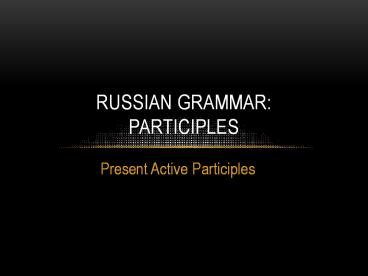Present Active Participles - PowerPoint PPT Presentation
Title:
Present Active Participles
Description:
RUSSIAN GRAMMAR: PARTICIPLES Present Active Participles OVERVIEW In this tutorial we will cover the following topics: What is a present active participle? – PowerPoint PPT presentation
Number of Views:209
Avg rating:3.0/5.0
Title: Present Active Participles
1
Russian GrammarParticiples
- Present Active Participles
2
Overview
- In this tutorial we will cover the following
topics - What is a present active participle?
- How is this participle used?
- How is this participle formed?
- Quiz on present active participles
3
What is a present active participle?
- Participles are verbs that behave like adjectives
in that they describe nouns - English examples include
- Running water gt cf. English verb to run
- Sleeping children gt cf. English verb to sleep
- Hired hands gt cf. English verb to hire
- Arrested thieves gt cf. English verb to arrest
- Participles are helpful because they allow us to
express a lot of meaning in fewer words. For
example The arrested thieves stood trial.
Instead of The thieves who were arrested stood
trial. It doesnt save a lot of space, but it
gives utterance a higher, more erudite style.
4
EXAMPLE OF A PRESENT ACTIVE PARTICIPLE FROM
TOLSTOYS WAR AND PEACE
- ???? ???? ??? ??????, ??? ?? ?????? ?? ???? ? ???
??????? ? ???? ?????????, ??, ????????, ?? ???
????? ???????? ???? ?? ???? ??????????? ? ???????
?????? ? ???????????? ??????????? ???????. ???
??? ????? ?????? ? ?? ????? ??????? ????????
????? ???????. - Helen was so beautiful, that not only was no
shadow of coquetry noticeable, but, rather, it
was as if she were ashamed of her indisputable
and incredibly powerful and conquer-inducing
beauty. Is seemed as if she wanted, but could not
diminish the effect of her beauty.
5
What are present active participles?
- Present active participles are participles that
describe present-tense actions and they are in
active voice - English examples of these types of participles
are - I see the sleeping child.
- I see the burning house.
- I see the moving car.
6
What is active voice?
- Active and passive voice differ in how they view
the subject and/or the direct object of a
sentence. - Consider the following example
- The car hit Bob.
- This is an active sentence. It has a subject, a
verb, and a direct object. - The subject of the sentence is the person
actually performing the action.
7
What Is passive voice?
- We can make this this sentence passive by
switching word order. - Bob was hit.
- This is a passive sentence.
- The subject of the sentence is not actually the
person/thing performing the action. - We can also say Bob was hit by the car and it
will still be passive.
8
Active Voice and Present Active Participles
- Present active participles in Russian can only be
used to describe something that is actually
performing the action, thus it can be used with
active constructions, not passive ones. - ? ????????? ? ?????????? ????????.
- I talked with the shopping woman.
- The woman is the one who is shopping so we use a
present active participle.
9
How Are Participles Used?
- In Russian participles are typically used in
writing, not in speaking. If you are looking to
get more practice using participles, I would
definitely recommend reviewing how to use ???????
since it will help you immensely in using and
understanding participles. - In Russian participles are used in three ways
- Like adjectives to describe a noun ???
?????????? ??????? or ??? ?????????? ?? ??????
???????. - Like relative pronouns to describe a noun ???
???????, ?????????? ?? ??????. - Like nouns when the noun is left out because it
is understood ?????????? ??????.
10
How Are Participles Formed?
- Present Active Participles
11
Making Present Active Participles
- These participles are formed from verbs in the
present tense that are imperfective - (Remember that perfective verbs do not have a
present tense form)! - Form 3rd person plural of verb (??? form)
??????, ???????, ???? - Remove final -? ?????-, ??????-, ???-
- Add -?- ??????-, ???????-, ????-
- Add the ending -?? and then decline it to agree
with the word it is describing (in number, case,
and gender) - If verb is reflexive, add ?? to the end
(participles never end in the ?? ending) - ???????? ???????, ????????? ???????, ??????
????, ???????????? ???????
12
?????
- Answer the following questions about present
active participles - T or F - Present active participles can only be
formed from past-tense verbs - FALSE - They are formed from present tense verbs
- T or F - Present active participles can only be
formed from imperfective verbs - TRUE - They are only formed from imperfective
verbs - T or F - Present active participles are formed
using the letter -? - FALSE - They are formed using the letter -?
(e.g., ??????? ???????)
13
Practice forming Present Active Participles
- Use the following example to practice forming
present active participles - Start with ???????
- Form the 3rd person plural form of present tense
verb - ???????
- Remove the final -?
- ?????-
- Add the participial ending and adjective suffix
- ?????????
- Decline the participle so it fits in the
following sentence ? ????? ________ ?????. - ? ????? ????????? ?????.
14
??????????
- Form present active participles for the following
verbs - ??????
- ????????
- ??????
- ????????
- ??????
- ??????
- ????????
- ????????
- ?????????
- ???????
- ?????????
- ???????
- ??????
- ??????????
15
Congratulations
- You have now finished this tutorial on present
active participles. If you have further
questions, consult a Russian grammar book or talk
with your Russian instructor.































